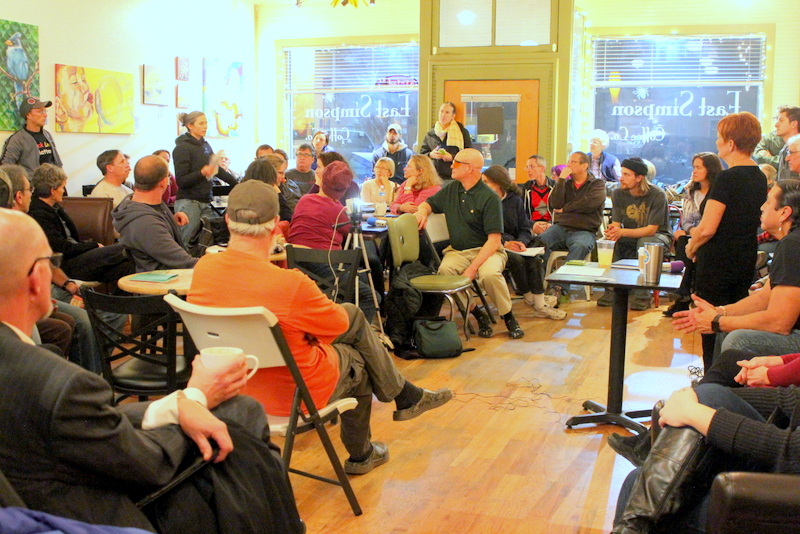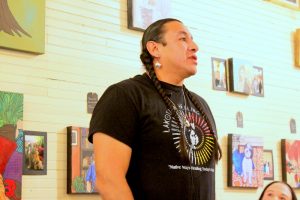 “Oil and gas has a playbook on how this stuff works. You guys be cautious about these guys coming into your community. They are knocking on your doors and they’re in suits and ties, and [they say] ‘hey we’re your friends.’ These guys are the devil in disguise.”
“Oil and gas has a playbook on how this stuff works. You guys be cautious about these guys coming into your community. They are knocking on your doors and they’re in suits and ties, and [they say] ‘hey we’re your friends.’ These guys are the devil in disguise.”
Those were the words heard at a Lafayette community meeting on Wednesday from John Olivas of Mora County in northern New Mexico who shared his personal experience with hydraulic fracturing or fracking in his community. About 60 interested parties turned out to hear about a history of land, water, and air protections in other parts of the country over time.
The group is also taking a proactive stance on gearing up to confront an expected oil and gas industry surge in hydraulic fracturing applications.
Doug Good Feather, Hunkpapa from the Standing Rock Lakota Dakota nation, an area that encompasses areas of both North and South Dakota, talked about the concept of long-term struggle and generations fighting for future generations,
“From seven generations ago, we had our ancestors. They believed in the future of their children’s children’s children, which is all of us. In order for that, they must preserve our future generations to have what they had then. So they prayed for us then, even when the fight was going on back then. So today that seven generations has come full circle here. So now it’s our turn.”
 Good Feather added that change sometimes comes with a “mask on,” referencing the resistance to the Dakota Access Pipeline, “It’s something that will fool you to believe something that’s not true. And by the time you get it, they’re long gone and took all the resources out,” referring to the fracking industry that has permeated the two states.
Good Feather added that change sometimes comes with a “mask on,” referencing the resistance to the Dakota Access Pipeline, “It’s something that will fool you to believe something that’s not true. And by the time you get it, they’re long gone and took all the resources out,” referring to the fracking industry that has permeated the two states.
John Olivas, Traditional Community Organizer from Guadalupe Hidalgo Treaty Land in northern New Mexico gave a recent example of Good Feather’s point. Olivas who had spoken on Tuesday to Lafayette City Council said that the oil and gas industry started its interest in his neighborhood by visiting Mora County around 2004,
“Oil and gas started coming into our community and started visiting our county courthouse. They would come into the clerks office and to the assessor’s office. By the time we figured out what these guys were up to, they had identified all of the mineral rights within our community. They had leased 140,000 acres of land. The worst part about it, these guys were negotiating specifically with these private landowners who had no clue what the heck they were signing.”
 Olivas added that some landowners signed lease contracts for 25 cents an acre in some cases, and $1/acre in others on land with a market value of $15-22 per acre. The industry was able to sign ten year leases on the land after a campaign in which Olivas drew comparisons to what Colorado has seen, “Oil and gas started doing presentations to the Commission. It’s textbook. They said how much money was going to come in, all the jobs that it was going to create.”
Olivas added that some landowners signed lease contracts for 25 cents an acre in some cases, and $1/acre in others on land with a market value of $15-22 per acre. The industry was able to sign ten year leases on the land after a campaign in which Olivas drew comparisons to what Colorado has seen, “Oil and gas started doing presentations to the Commission. It’s textbook. They said how much money was going to come in, all the jobs that it was going to create.”
Mora County is located at the base of the southernmost tip of the Rocky Mountains called the Pecos Wilderness and not only is a major watershed for northwestern New Mexico, but supplies water to the entire state and parts of Texas. Olivas says that his community is the first user of the water.
Olivas added that in one of the poorest counties in the nation, the oil and gas industry promises were appealing, and that in its early stages of the resistance few people showed interest in taking on the industry, “We had public events; We never had this many people in public meetings.”
Olivas himself, ran for County Commissioner of Mora County. He won, and in 2013 an ordinance passed to ban oil and gas in the county. It was the first in the country at the time. But by November of the same year the county was sued in federal court.
Given this experience, Olivas advised the Lafayette community against one mistake that he said his community made, “If you guys are going to pass this ordinance, make sure you have someone coming in whose going to help defend it. That’s what we didn’t do.” Olivas was up for reelection the following year and he said the industry poured money in to defeat him. “These guys are pretty smart. I never realized how these guys do it. They started spreading propaganda within the community that people were going to lose their land, that taxes were going to go through the roof.”
He was defeated in the November 2014 election and in 2015 the ordinance was repealed.
Mora County has been spared the fracking industry onslaught for now according to Olivas who thinks that the drop in natural gas prices is the reason, “Until we have an immediate threat like you guys do here in your backyard [our community] isn’t going to come out like you guys have tonight.”
“They’re going to come into your community. They’re going to rape and pillage, and then they’re gone. Don’t be fearful about oil and gas coming to sue you guys because they’re going to sue you. You guys don’t realize how many eyes are on you guys. There’s a whole lot of eyes on you guys. You guys are setting the precedent.”
In 2013, the Community Rights Network was founded following the election of Merrily Mazza to Lafayette city council. Soon after the group penned the Climate Bill of Rights which has as its main premise the right to clean air and water, and all future generations.
Groups twice attempted to pass a state ballot initiative giving communities local control to decide, but in one case the petitions were withdrawn by Representative Jared Polis in a deal with Governor Hickenlooper to form an oil and gas “task force” which many say had disappointing results. Last year signatures for a ballot measure were deemed insufficient by the Secretary of State’s office to bring the issue to the voters, “It’s hard to do unless you have a quarter of a million to pay petitioners,” Mazza conceded the added difficulty of attempting that avenue again in the future, “Oil and gas supported Amendment 71 making it harder for groups to get anything on the ballot unless you are wealthy.” The amendment that passed in 2016 now requires that proposed constitutional amendments be signed by 2 percent of the voters in each of the state’s 35 Senate districts and upon a vote, win a supermajority of 55 percent of the vote.
Mazza said the group is committed to working at the local level, “You have to start at the local level with the government who is most accountable to you.” She said that Lafayette doesn’t want to approach the problem as Boulder has with moratoria, “Which does nothing”, or as Longmont has with banning the fracking technique, “The other approaches I’ve seen are never gonna work. You’re going to decide what color tan the tanks are in your backyard.”
“We in Lafayette have the right to a healthy climate, and we have the right to protect that climate – our city does – by banning oil and gas extraction and injection wells.” Mazza explained the inspiration behind the forming of the Bill. The Climate Bill of Rights provides for residents to also have the right to enforce the recognition of those rights through direct-action, “If the city does not enforce this once it’s passed, we have the right to enforce this using direct action, and the local police cannot interfere with our right to do nonviolent direct action to carry out the extent of this law.”
But Mazza acknowledged the challenges that communities have faced confronting the oil and gas industry, “This industry has a heavy hand. They’ve already been to the council meetings and told us they were going to sue again. The attorney was there from the Colorado Oil and Gas Association.”
Mazza’s response to the industry? “Got to hell! How dare you say that you have more rights than we do!” She explained that a rights-based approach provides the most challenge to the industry, “It’s too powerful to hear people stand up in a council meeting and hear, ‘The Colorado Oil and Gas Act is unjust.’ And unjust laws do not have to be obeyed.”
Oil and gas representatives also have been reported to be canvassing the community and even circulating a petition, to which Mazza responded , “This industry does not care about you. They don’t care about your kids. They don’t care about your property values. They don’t give a damn about anything. It’s a money-making business. When you get that in your head, then you’ll understand what you’re dealing with.”